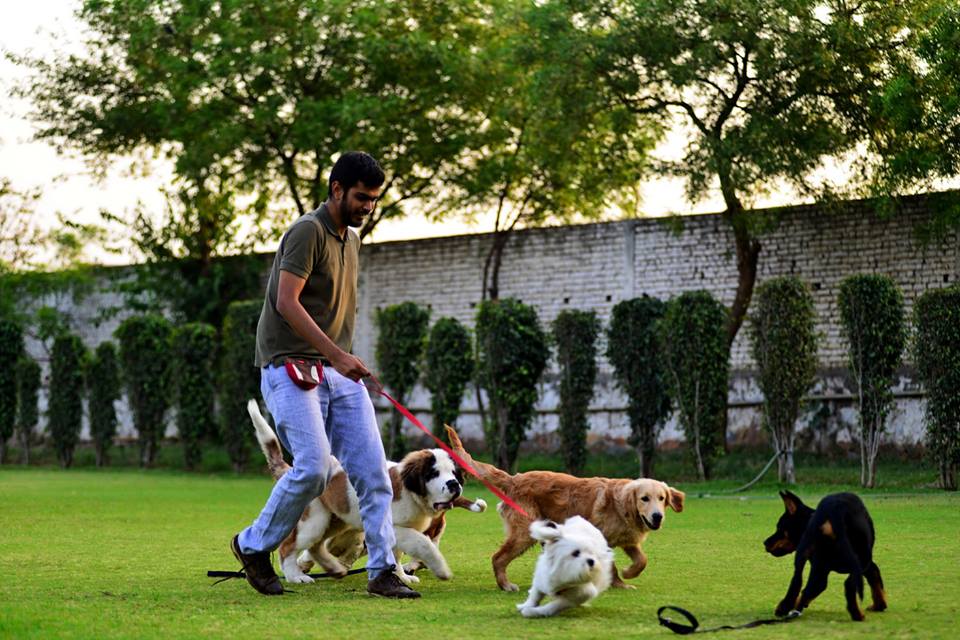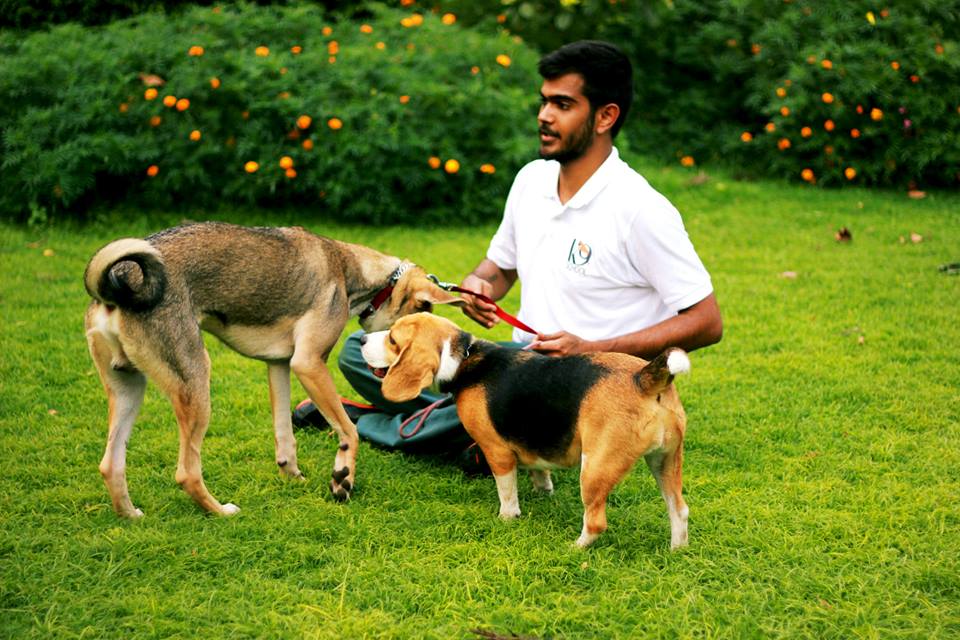Dog training is an important part of any dog's life for many reasons. It not only provides mental stimulation but also keeps your dog happy and healthy. Pet trainers play a crucial role in providing training to dog, hence, demand of professional pet trainers are increasing with a great pace in India.
Petsworld always strive to provide you well-researched blogs on pet training. We also got a chance to interact with a certified pet trainer Mr. Adnan Khan and we asked him some questions related to the pet training industry. In this interview, he shared with us some useful information about growing pet training industry. Here are excerpts from interview with Mr. Adnan Khan:
1. Please share with us a little about the inspiration that help you to become a professional dog trainer.
It is quite a unique story if we compile the chain of events that led to being where I am. Being born in a Muslim home, my grandmother with her newly acquired religious legislature forbade me to keep a pet dog at home. Quite ironic, as to how everyone else in my family had pets before I was born. My interest in dogs increased so much over the year that I started training and bonding with strays at a very young age. I discovered dog training and behaviour around 10 years of age and have never stopped learning ever since.
I also volunteered in NGO’s to walk dogs and assist around shelters from 13 or 14 years of age. I took up the task of training any new pet in my circle of friends and family out of keen interest, while consulting 100s of books, videos, research papers etc.
I have a Bsc. in Business Management from the UK and I tried my hand at employment but I was getting restless as entrepreneurship has been my lifelong dream. Putting my dream and passion together I started taking behaviour consultancy sessions part-time while working with a pet e-commerce. Eventually with the support of my past employer and a few close friends, I decided to finally work on my own dog training startup called K9 School India.
2. You are an internationally certified trainer and behaviour expert. Which type of education or training did one needs to complete to become certified dog trainer?
I recently completed a 4-week Police Dog Training and Kennel Management course from Holland for which I was certified. We also agreed upon a partnership with them for expanding the reach of advanced trained dogs in India.
Personally, dog behaviour and training is such a particular field, that any form of interest is first rooted from a thriving passion towards the species before even considering it as a professional choice. The will to constantly learn new forms of art (training) and new concepts of behaviour modification cannot be taught in any certification program.
Regardless of any certification, I would always call my pool of knowledge self-acquired from teaching my own self about concepts and applying them in the real world. Exposure to formal education and practice, however, is still very important to get your approach to be more effective.
The field of dog training is vast and the potential in India is immense. Certifications are commercially available across the world, but I have seen many ‘certified’ who have no additional knowledge or experience besides the 20-day long program. In such cases, certifications lose value over the internal willingness to work hard and constantly educate your own self.
3. Pet training Industry is growing rapidly in India. According to you, what is the coolest thing happening today in the pet training industry?
Dog training as an industry is growing for both consumers and job-seekers collectively. I have observed a few people like myself who have left their stable jobs or even college to pursue their interests after being duly exposed to the tremendous scope this field has.
Earlier there used the be a select few trainers who were either retired Army/Police/BSF dog trainers or just regular obedience trainers who used aversive or counter-productive methods. Else, there were some who had been training for decades but did not seem to be getting the results or responses.
Pet ownership as a whole is seeing a revolution. More people adopting and buying pets without ample research leads to various behaviour problems and demand for training too.
Besides pet training, I think India is much far behind in various advanced forms of training which K9 School is hoping to contribute in. It is quite shocking the dearth of protection and detection dogs besides government services. Whats worse is the total absence of guide dogs and therapy dogs in India.
My company, K9 School is aiming to revolutionise many forms of training and introduce services to India that have been prevalent in various developed countries. We were the first to introduce socialisation and obedience based group classes for pets in Delhi-NCR, also providing formal lectures to owners and graduating certificates to pets. We also aim to expand into police dogs as well therapy/service dogs gradually.
4. As we can see there are many trainers offering different training classes and sessions for the dogs. How can someone decide if a class or trainer is the right fit for his dog’s needs?
The most ideal thing one should do is doing a background check on the trainer from prior clients or a page/website of the same. At present, dog trainer industry is very unorganised and most trainers rely on ‘word-of-mouth’ and ‘door-to-door marketing’. Hence, it is very difficult to ensure that one should trust the trainer with their dog.
Another very important aspect to observe is whether they are willing to train the dog in front of the owner and explaining their methods to the owner effectively.
I follow a completely different approach where I try and cover the whole case in one session itself, in case it is not overly complicated. In my 2 hour session, I spend most of the time talking to the humans and exploring the root cause of the issue as well as how we can fix it. I try in making my methods crystal clear to the owners from the first session so it is easy for them to practice with their dog repeatedly and effectively.
I believe in the concept of training the human who is most involved with the dog in question to be able to modify the behaviours successfully.
Dog training is much more than training a dog for show or training it to be obedient. What according to you is the most difficult aspect of dog training?
The most difficult aspect for me as a dog trainer would be consistency and repetition. Many a times, even I lose the consistency in my own dogs’ trainings because of being far too busy with my dog training startup, pardon the irony.
As a dog behaviour consultant, the most difficult aspect in the world of dogs is the HUMANS! Yes, they are the causative factor to most behavioural issues in one way or the other and the owners of dogs are the only way to fix the behaviour problems.
Most pet owners, however, perceive training of a dog as installing a new software by the trainers; where they want little or no involvement in the entire journey of conditioning the dog for obedience.
Overall, if society’s perception of human and dog psychology evolves, they will become a little more open towards learning and being involved in the process.
6. Could you share with us the dog personality traits that are most important to cultivate in every dog?
For me as a dog owner AND trainer the most important trait to nurture in the dog is ‘confidence’. The level of confidence I am talking about comes from regular training and intensive socialisation.
Lack of confidence is the recipe for tons of behavioural issues like fear, aggression, separation anxiety, barking, whining, scratching, digging etc.
Most pet owners feed their insecurities and lack of confidence to their dogs. Due to their anxiety and lack of knowledge, their dogs get less walks than the ideal amount and rarely get to meet new dogs.
As part of my confidence building programs I ensure my dogs meet with hundreds of new dogs before the age of 12 months and and have dog friends who they meet regularly.
In addition, it is important to take your dog to new places, meet new people and follow the commands in various situations like during play, exercise, socialisation, feeding etc.
Potential police dogs are exposed to advanced stimuli like loud sounds, machines, explosions, gunshots and many high intensity environmental factors to make them desensitized for the future. This means their level of confidence
7.I’m sure training young dogs and puppies you’ve had many laughable situations. Please share with us the most memorable situation.
My most memorable ones have been my own foster pets or the ones that I got home to train as I got to interact with them the most.
My first dog was at the age of 20. Homer, the Bullmastiff who is two years old and is the most critical part of my life. He is the ‘sensei’ of our training school and his ‘zen’ energy is one to be learned from when it comes to pets.
I fostered 2 Rottweiler pups in January who just made us relive the puppy days but twice as bad and much higher energy. They would chew and destroy things much faster than Homer but would be super cute nonetheless.
And the group classes that have recently been introduced were always funny. You may check them on our page on Facebook called K9 School India.






